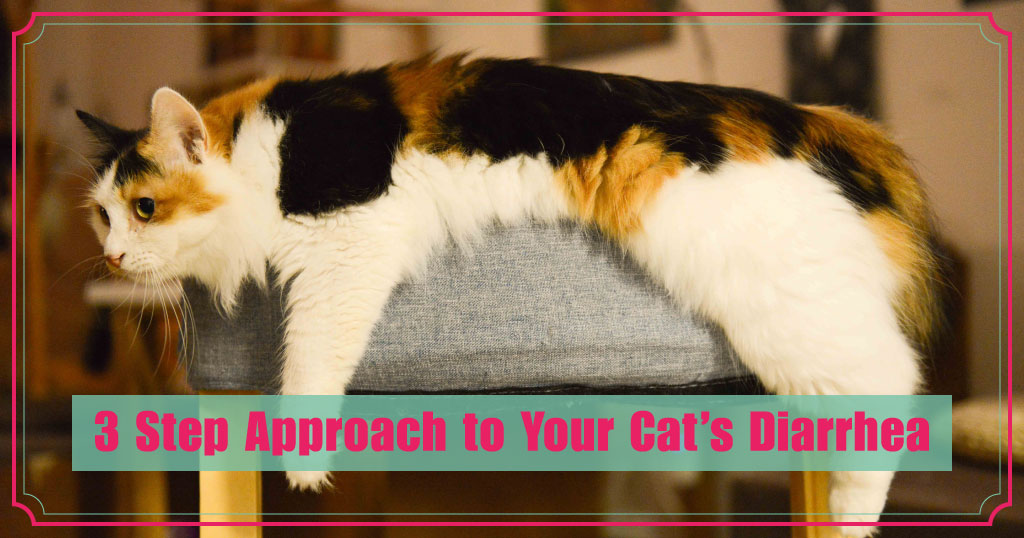If your cat is struggling with diarrhea, you’re not alone. There are so many reasons for diarrhea in cats, and so many reasons to want it to stop.
In this article, I’m going to discuss 3 steps to finding a solution to your cat’s diarrhea. But first, let’s go over 3 common reasons that cat’s stools are loose to begin with.
3 Common Causes of Diarrhea in Cats
- Parasites. Parasites are an especially common cause of diarrhea in kittens. A lot of this is due to their immature immune system, as well as their environment (such as living in a shelter or living outside within a feral colony).
In Colorado, the most common parasites we see in adult cats are tapeworms. These look like small, white rice segments in your cat’s poop, and are more common in outdoor cats who like to hunt.
- Inappropriate diet. For years, we’ve been feeding cats the wrong diet in the form of kibble. Cats do better on a more species specific diet, which is higher in protein and lower in carbs. In the world of commercial foods, this looks like canned or raw food. The wrong diet can cause inflammation and diarrhea in cats. Cats are carb junkies, so removing kibble from their diet can be tricky and they might protest. You can learn more about how to successfully remove kibble from your cat’s diet in my article here.
- GI disease. Cats are especially prone to GI diseases, which can be exacerbated when feeding the wrong diet. Often, the first symptom of these diseases is diarrhea.
Common gastrointestinal diseases or conditions in cats include:- Inflammatory Bowel Disease
- Pancreatitis
- Feline Coronavirus (not the same as COVID-19)
- Constipation
- Cancer of the digestive tract (like lymphoma)
Irritable Bowel Disease (IBD) is so common in our cats, that Dr. Angie has written a 2-part series discussing it in it’s entirety. IBD Part 1 is available to read here, and IBD Part 2 is available to read here.
3 Steps to Ending Your Cat’s Diarrhea
- Diagnostics. Finding the root-cause for your cat’s diarrhea is key, and not always easy. Diagnostics are not a one-size-fits-all approach, and are going to be very specific to your cat and their symptoms.
Common diagnostics for episodes of diarrhea in cats include:- Fecal test
- Diarrhea PCR (a fecal test that literally analyzes the DNA of your cat’s poop!)
- Comprehensive blood work
- Abdominal ultrasound
- FeLV/FIV test (specifically on kittens with chronic diarrhea)
- Diet. Just as diet can be a cause for diarrhea, it can also be the solution! The right diet can be enough to provide the necessary relief to your cat’s digestive tract, allowing for it to settle down and for diarrhea to resolve.
Common successful diets, or diet changes, for cats with diarrhea include:- Adding fiber (like canned pumpkin or squash)
- Transitioning to an all canned diet
- Transitioning to a raw diet
- Rx GI diet (we use Blue Buffalo’s GI canned formula)
- Rx novel protein diet
- Rx single protein diet
- Probiotics. A quality probiotic helps promote good gut flora (AKA healthy bacteria) in the digestive system. This provides space for optimal gut health and, you guessed it, healthy poop.
In Dr. Angie’s practice, we use RxBiotics and Thorne Bacillus Coagulans. Periodically rotating probiotics can be helpful by introducing different strains of bacteria into your cat’s gut flora population.
Pro-tip: Do not start or stop too many things at once.
This is a easy mistake to make because our cat’s diarrhea leaves us feeling desperate to gain a hold of it, and it’s easy to get lost in a Google search or in the advice of others.
Be strategic with your plan. When you implement a change, do so with intention and space. For example, if you’re planning to change diet and add probiotics to your cat’s treatment plan, allow at least 3-5 days between each change. This will allow for you to see what is working and how your cat is responding to each adjustment.
Dealing with diarrhea in cats is exhausting, and it’s stressful. It stinks (get it?)! My hope is that this article empowers you with steps to take, and questions to ask, as you continue advocating for your cat’s optimal health and best life.
You are doing a great job!
Love,
Claire



Oh wow, I was just dealing with something like this with my cat last week! It’s crazy how something as simple as stress or a food change can throw off their whole system. This article really helped me connect the dots—definitely going to try that 3-step approach.
So glad you found this article to be helpful and we’re hopeful the steps were helpful for your kitty! JoJo